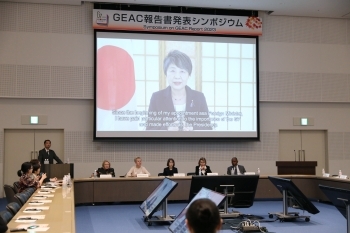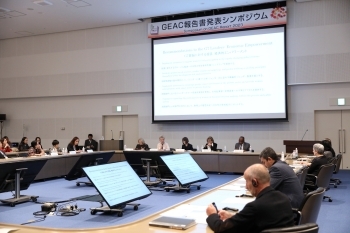Women's Empowerment and Gender Equality
G7 Hiroshima Summit Follow-up event: Symposium on GEAC Report 2023
-Towards Gender Equality and Women’s Empowerment-


On December 13, commencing at 10:00 a.m. for approximately two hours, the G7 Hiroshima Summit Follow-up event: “Symposium on GEAC Report 2023 -Towards Gender Equality and Women’s Empowerment-“ was held at the Elizabeth Rose Hall on the 5th floor of the United Nations University Headquarters building. The following is a summary of the event.
- In her opening remarks, Ms. UENO Michiko, Special Advisor to the Prime Minister for Women's Empowerment, Consumer Policy and Elderly Policy, noted that Japan, as the G7 Presidency of this year, has led the G7's efforts on gender issues on various occasions. She stated that Japan would continue its efforts for further gender mainstreaming taking into account the recommendations of the GEAC (the message was read by Mr. IMAFUKU Takao, Deputy Director-General / Deputy Assistant Minister (Ambassador) on her behalf). In her video message, Minister of Foreign Affairs Ms. KAMIKAWA Yoko referred to the "Nexus Approach" proposed by Japan at the G7 Hiroshima Summit in May of this year, which was supported by the G7 leaders, and stated that the recommendations in the final GEAC report to be made public today are consistent with the G7's thinking. Minister KAMIKAWA also welcomed that “ensuring the full implementation of Women, Peace, and Security (WPS)” is included in the recommendations.
- Subsequently, on behalf of the GEAC members, Ms. Hedwige Nuyens, the Chair of European Women on Boards; Ms. Sarah Sands, Deputy Chair of the British Council; Dr. Maxime Houinato, Regional Director, UN Women East and Southern Africa Regional Office; and Amb. Melanne Verveer, Executive Director, Georgetown University Institute for Women, Peace & Security (and former US Ambassador for Global Women’s Issues) gave a presentation on the four pillars that comprise the final report: economic empowerment, education, peacebuilding, and data. Each presenter introduced GEAC’s recommendations to the G7 leaders on each pillar that were devised based on case studies and best practices.
- Then, the above four members were joined by Ms. Caroline Farberger (Chair, Board Member, Investor), Dr. KURODA Reiko, Designated Professor at Chubu University/ Professor Emeritus at The University of Tokyo, and Ms. Anda Sapardan (Co-Founder of Sehati TeleCTG) under the leadership of Dr. SHIRAHASE Sawako, Chair of GEAC (and Professor of University of Tokyo), the eight GEAC members in total discussed the contents of the report from the perspectives of experts in various fields with knowledge of gender issues. During the question-and-answer session that followed, the GEAC members responded to questions from the audience and vibrant exchange of views took place, which was followed by a summarization of the report’s findings and recommendations by the GEAC Chair, Dr. SHIRAHASE.
- Following special remarks by Dr. Tshilidzi Marwala, the Rector of the United Nations University and Under-Secretary-General of the United Nations, Amb. SAIKI Naoko, Ambassador in Charge of Women’s Issues, concluded the symposium by expressing her hope that GEAC will play an increasingly important role in the G7 process next year and beyond, with a respect for GEAC as well as gratitude to Dr. SHIRAHASE who successfully compiled the report.
(Reference1) GEAC: the Gender Equality Advisory Council
The GEAC is an external advisory body that makes recommendations on gender equality for G7 leaders. Launched in 2018 by Canada during their G7 Presidency and has since been convened by the respective G7 Presidency each year. The GEAC has submitted recommendations to the leaders of the G7 to achieve gender equality and promote the empowerment of women.
This year, 14 members actively involved in the gender field from the G7 and other countries as well as international organizations were appointed and submitted a summary of recommendations to Prime Minister Kishida on May 8, prior to the G7 Hiroshima Summit.
(Reference2) GEAC Final Report "Gender Mainstreaming for an Inclusive, Peaceful, and Just Society"
This report is the final deliverable by GEAC 2023 members, convened by Prime Minister Kishida as leader of the G7 Presidency.
In the report, concrete measures to promote gender mainstreaming were recommended to G7 leaders in the four pillars of "economic empowerment", "education", "peacebuilding", and "data", based on case studies and best practices in each pillar.


